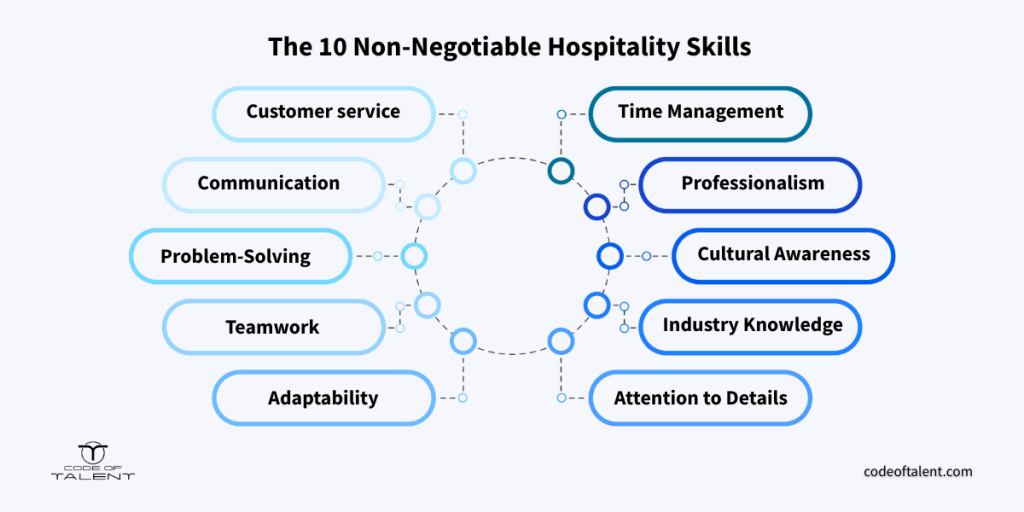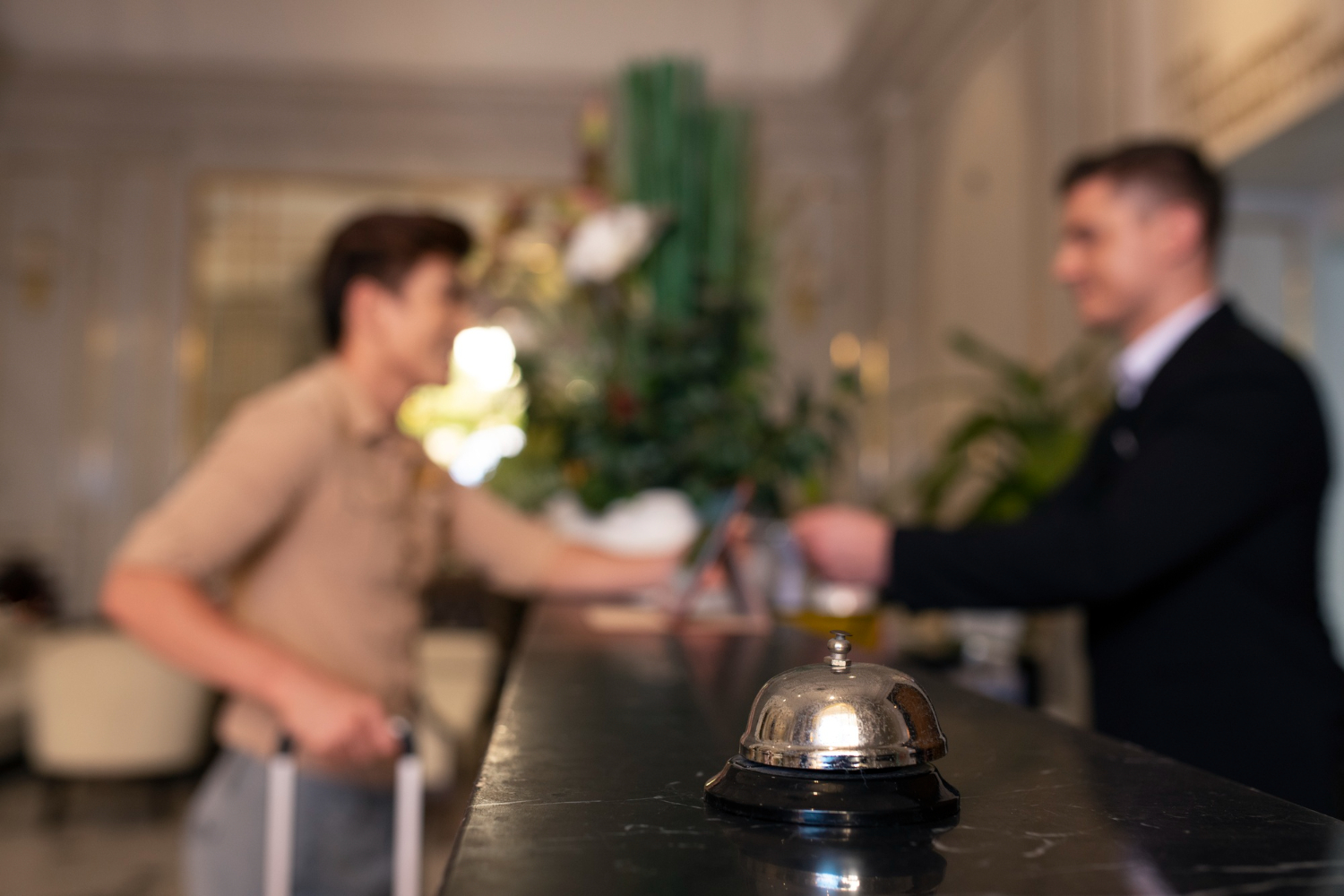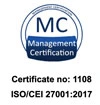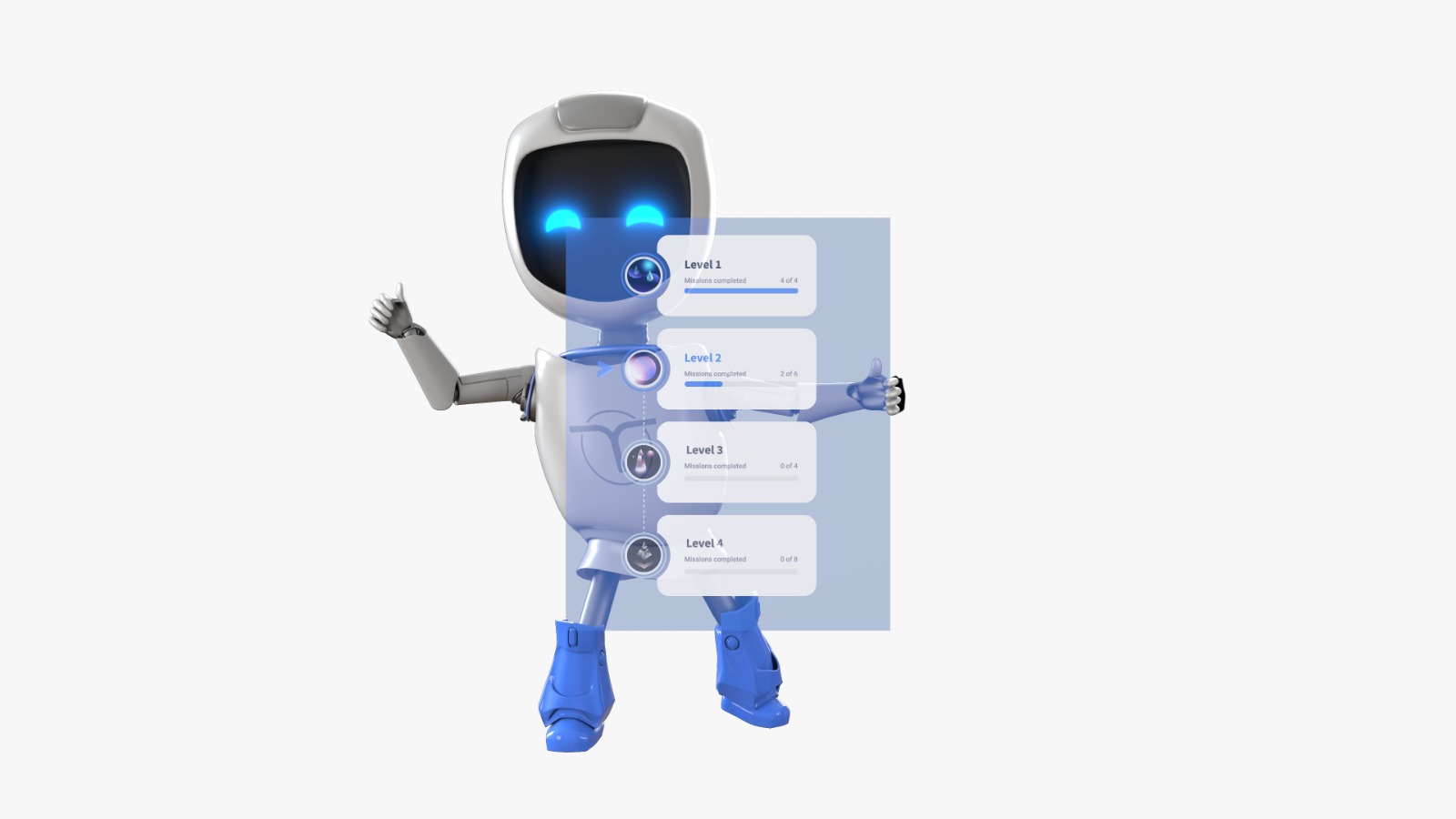In an industry where guest satisfaction is everything, having a team equipped with the right hospitality skills can make or break a business. These skills are the difference between average service and an unforgettable experience that guests rave about (and come back for).
According to research from HubSpot, 93% of customers are more likely to make repeat purchases from companies that deliver excellent service. On the flip side, 48% have switched brands in the past year alone because they weren’t getting the level of care they expected.
This is why hospitality skills are non-negotiable. Whether someone is greeting guests at the front desk, managing a full dining room, or coordinating back-of-house operations, how they show up can shape the entire guest experience.
In this article, we’ll walk through the 10 non-negotiable skills in the hospitality industry that define great service and how to effectively train your team to master them.
Top 10 Essential Hospitality Skills
The success of a hospitality business depends on how well its team connects with people. It’s not just about following procedures but also about building trust, reading the room, and responding with care. The following are core soft skills any hospitality employee needs to master.

1. Customer Service
At first glance, it might sound like a paradox saying that “customer service” is a critical hospitality skill for delivering great customer service. But in this context, we’re not referring to the industry, the department, or the job title, but to the personal ability to truly value and care for the customer.
According to a study by the International Journal of Future Management Research, customer service ranks among the top soft skills in hospitality, closely tied to communication, teamwork, and service attitude.
Customer service as a skill is rooted in the mindset to put the guest first and anticipate their needs. It’s about:
- Ownership
- Empathy
- Making sure the guest always feels respected and appreciated, even when things go wrong.
2. Communication
You can’t deliver exceptional hospitality without strong communication skills. It’s one of the top qualities employers seek, according to Hospitality Insights, and it goes far beyond just choosing the right words.
Research shows that up to 93% of communication is non-verbal. That means body language, tone, facial expressions, and gestures play a bigger role than we think.
To communicate well, staff need to:
- Use a calm, friendly tone
- Keep open body language and natural gestures
- Choose words carefully for the situation
- Smile, genuinely and often
Here’s how non-verbal communication cues translate to customers:
- A warm tone puts guests at ease
- Rushed or monotone speech can feel dismissive
- Crossed arms or lack of eye contact can signal disinterest
Good communication in hospitality is also about listening just as much as talking. Something as simple as using hand gestures to guide a guest, nodding as they speak, or maintaining comfortable eye contact can build trust quickly.
3. Problem-Solving
In a people-first industry like hospitality, problems and conflicts arise often. This is why problem-solving is a must-have skill in hospitality at every level, from frontline staff to management.
Whether it’s a double-booked room, a scheduling issue, or a spill in the lobby, many situations demand a fast response, often before a manager can step in. Therefore every team member needs to be able to think clearly, stay calm under pressure, and take initiative.
Problem solving can take many forms, but it usually involves:
- Conflict Management: Disagreements can happen between guests, between staff, or even between guest expectations and reality. When they do, employees should be trained to listen actively, remain neutral, and offer solutions that respect all parties involved.
- Safety and Risk Management: Problem-solving also means staying alert to prevent accidents and respond swiftly when something’s off. Knowing how to follow protocols, identify risks, and act without delay is a core part of delivering a safe guest experience.
4. Teamwork
No one excels in hospitality alone. Behind every excellent service is a team working in sync. In fact, collaboration can increase customer satisfaction by up to 41%, according to a report on the benefits of collaboration.
A strong hospitality team has a well-established system in which everyone has a role, knows where they should be, what needs to be done, and how their actions affect the next person’s work.
Great teamwork in hospitality includes:
- Covering for each other during busy or unexpected shifts
- Helping out during emergencies or stressful moments
- Motivating one another on difficult days
- Building systems together that make daily operations smoother
Teamwork is about trust and rhythm. When teams run like clockwork, guests feel the difference. There are fewer delays, fewer mistakes, and a stronger sense that they’re in capable hands.
5. Adaptability
LinkedIn’s 2024 report highlights that employers see adaptability as the most in-demand skill, thanks to rapid tech advancements and evolving customer needs. In hospitality, change is constant—whether it’s keeping up with trends, meeting rising guest expectations, or updating outdated practices.
Adaptability is also one of the reasons people leave the hospitality business: people can’t keep up with the changes and find work somewhere else.
Being adaptable in hospitality means:
- Staying calm and flexible when unexpected changes occur
- Quickly learning new technologies and procedures
- Adjusting service styles to fit different guest preferences
- Embracing change as an opportunity, not a setback
6. Time Management
In hospitality, timing is everything. Whether it’s turning over rooms before check-in, delivering meals while they’re hot, or juggling multiple guest requests at once, time management directly impacts service quality.
Hospitality teams often have to meet tight deadlines while keeping their cool. Poor time management leads to delays, frustrated guests, and stressed staff. But good time management at the team level starts with strong time habits at the individual level.
Strong time management includes:
- Prioritizing tasks: Knowing what needs attention now vs. what can wait
- Working efficiently without cutting corners: Especially during high-traffic times
- Balancing speed and service quality: So guests never feel rushed or ignored
- Planning ahead: Anticipating busy periods and being ready for last-minute changes
7. Professionalism
Professionalism shows up in appearance, tone, punctuality, and emotional control. The NACE Job Outlook 2022 survey found that while most employers value professionalism, fewer than half believe new college graduates actually demonstrate it well.
That matters in hospitality because a large portion of the workforce is made up of students and recent grads. Entry-level roles often attract people early in their careers, which means professionalism isn’t always instinctive and it needs to be taught and reinforced.
What professionalism looks like on the job:
- Emotional control: Staying calm and collected during tense situations
- Consistent, polite tone: No matter how difficult the guest or task
- Optimism: That helps lift the team during tough shifts
- Presentable appearance and body language: Because first impressions matter.
8. Cultural Awareness
Hospitality caters to a global audience. Whether you’re welcoming tourists from across the world or working in a multicultural city, cultural awareness is essential.
Guests bring their own values, customs, and expectations. When staff understand and respect those differences, they avoid awkward moments and create more respectful connections.
Cultural awareness in hospitality can include:
- Learning basic words or greetings in common foreign languages
- Understanding dietary restrictions tied to religion or tradition
- Knowing which gestures or phrases may be considered rude in some cultures
- Being aware of clothing customs or modesty expectations
- Adapting greetings such as bowing, shaking hands, or using formal titles based on cultural norms3
Done right, cultural awareness doesn’t just prevent misunderstandings, but it also improves guest satisfaction. A small gesture like greeting someone in their native language or asking where they’re from with genuine interest can instantly make them feel seen and appreciated.
9. Industry Knowledge
Similar to other industries and businesses, knowing how things work and evolve goes a long way in hospitality. Whether it’s the daily menu, cleaning protocols, or the latest travel trends, industry knowledge helps staff perform with confidence.
On the flip side, when a team member stumbles over a question about check-in policies or misinforms someone about menu items, it breaks trust and can lead to missed customers or even costly mistakes.
Staff who are well-informed can:
- Answer questions quickly and clearly
- Make personalized recommendations (which guests love)
- Spot trends early, like shifts in guest preferences or seasonal demands
- Identify what competitors are doing better
- Suggest improvements based on what they’re seeing on the ground
10. Attention to Details
In hospitality, the smallest things often make the biggest impression. A spotless glass, perfectly folded towels, or remembering a guest’s name, all of these details tell the customer: we care.
What strong attention to detail looks like in practice:
- Double-checking room setups or event layouts
- Spotting errors in orders before they reach the guest
- Monitoring ambiance such as music volume, lighting, scent, even temperature
- Noticing what needs to be done before someone asks.
When attention to detail is embedded in the culture, it shows. Guests feel genuinely taken care of, not just served. And in a business where reviews make or break reputation, it’s often those “little things” that get remembered and shared.
How to Improve Hospitality Skills: Intelligent Training Methods
Soft skills, whether we talk about hospitality skills or in other industries, are usually hard to train, as people come with their own biases and preconceptions. After all, learning a new skill or improving upon an existing one is about changing behaviors.
However, done right, soft skills training can have a lasting impact on both the employee and the employer. Follow the next 3 essential steps in training soft skills in hospitality and get inspired by practical examples of training methods that make developing these skills easier, faster, and more effective.
1. Figure Out What to Fix
With so many factors at play in soft skills training, it’s not always easy to identify which skill truly needs improvement. For instance, if someone isn’t cooperating well in a team, it might seem obvious that they need teamwork training. But looking deeper, you might find they’re just too quiet or hesitant to engage, which means communication training could be a better fit.
Ask your team and guests: Run a quick 5-minute survey or chat with staff and recent guests. “What’s one thing we drop the ball on in guest interactions?”
Spot the real pain points:
- Are guests unhappy with wait times?
- Do team members struggle to communicate during busy hours?
Translate into 3–5 key skills: e.g., “Active listening,” “Handling complaints calmly,” “Team coordination under pressure.”
2. Train with Real Scenarios
Run short, sharp sessions :
- Role-play common guest scenarios: check-in delays, special requests, upset guests.
- Pair people up: one plays guest, one staff.
- Switch roles.
Make it part of the shift:
- During morning huddles, run a quick scenario: “What do you say if a guest asks for a refund because of a noisy room at midnight?”
Teach in standards:
- Onboarding docs should have bullet points like: “Always say: ‘I’m sorry you experienced that…’”
- “Repeat the issue back to confirm.”
3. Reinforce It Daily
Spot check and shout-outs:
- Managers watch one interaction per shift; give praise or a quick tip.
- If someone handles tough guest feedback well, highlight it in team meetings.
Measure what matters:
- Track guest satisfaction scores, complaint resolution time, and staff turnover.
- If guest complaints go down or Net Promoter Score goes up, it’s working.
Use microlearning:
- Deliver training lessons in short modules spread over time, not all at once.
The microlearning method isn’t just convenient. It’s proven to work in training. For example, a McKinsey study found that participants who engaged in 4–6 hours of microlearning over three months showed 2.7x more improvement in adaptability-related behaviors like empathy, self-awareness, and compassion. They also saw 3x greater improvement in outcomes like job performance and ability to adapt to new situations.
4. Rinse and repeat
Every month, look at what’s improving, fix one weak area, and run another micro-session.
5. Use one training platform
Training hospitality skills consistently and effectively takes more than occasional workshops or scattered materials. To truly embed these soft skills into daily practice, you need a platform that brings everything together, one that allows for structured, trackable, and adaptive learning across your team.
This is where Code of Talent makes a difference.
Instead of juggling multiple tools or relying on outdated methods, Code of Talent helps you build custom learning paths that strengthen hospitality skills in real time. With it, your team can learn smarter, not harder, through:
- Microlearning modules
- Interactive simulation-based exercises
- Peer and manager feedback
- AI-personalized tasks and missions
- Mobile-friendly, on-the-job content
Your team can learn in minutes a day, without disrupting operations.
Conclusion
Hospitality is about people: how they’re treated, how they feel, and how they remember their experience. With top-tier hospitality skills, your team becomes the face of quality and care. From customer service to cultural awareness, every skill adds up to create loyal guests and stronger teams.
With tools like Code of Talent, hospitality professionals can work on their skills continuously, at their own pace, and with real business impact.
Start your free trial today and tailor a training program from scratch, designed specifically to build the hospitality skills your team needs most!
Cover photo: Freepik






